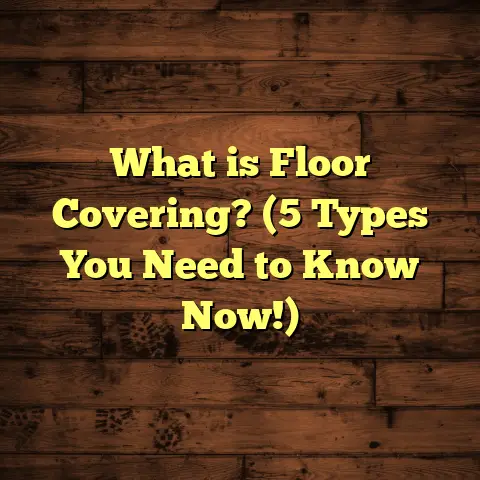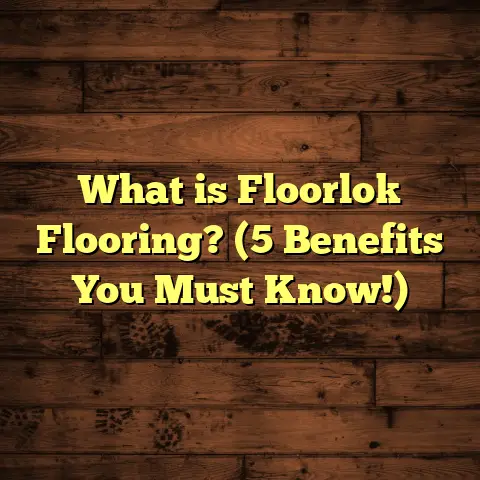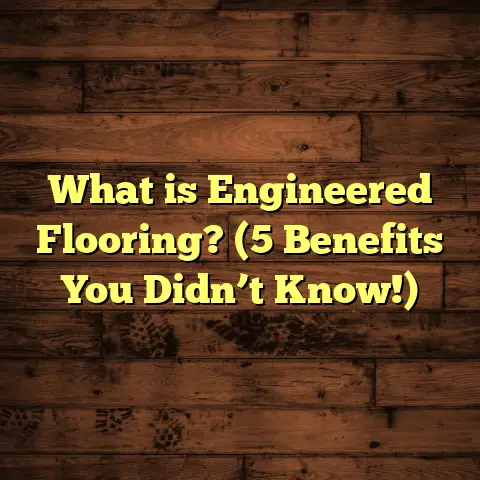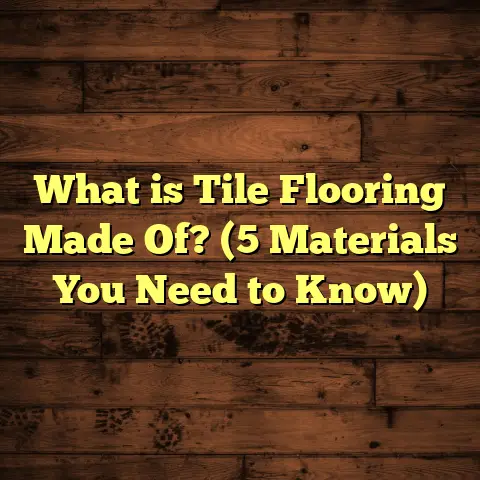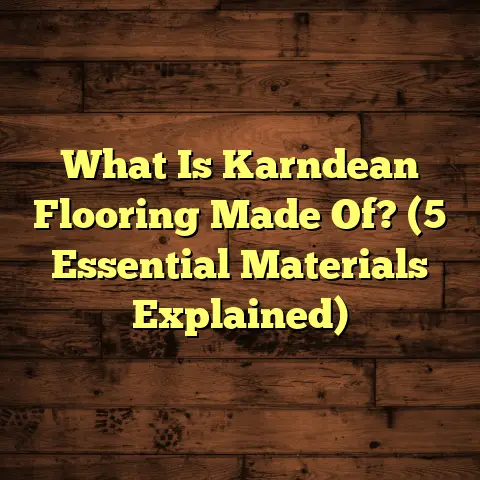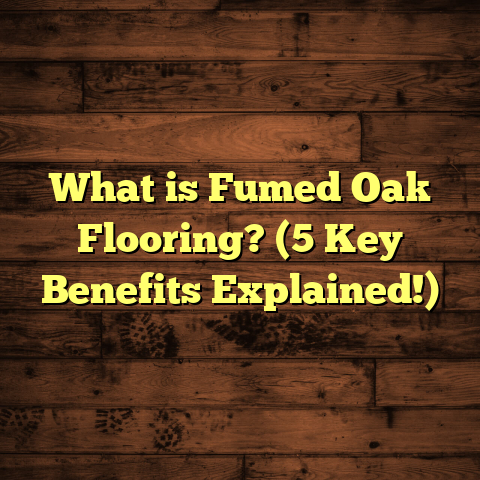What is More Durable: Vinyl or Engineered Flooring? (5 Key Comparisons)
I once had a client tell me, “Mizanul, choosing between vinyl and engineered flooring is like choosing between a sports car and an SUV — both get you places but handle differently.” That stuck with me because it’s exactly how I see it. Both vinyl and engineered hardwood floors have their perks and quirks when it comes to durability. Over the years, I’ve installed, repaired, and maintained both types in all kinds of homes—from bustling kitchens to calm home offices. So, if you’re wondering which one will truly stand the test of time under your feet, let me walk you through what I’ve learned.
What is Vinyl Flooring and Engineered Hardwood Flooring?
Let’s start by defining the basics because knowing what you’re dealing with is half the battle.
Vinyl Flooring: A Synthetic Marvel
Vinyl flooring is made primarily from polyvinyl chloride (PVC), a type of plastic that’s been around for decades. It can come as sheets, tiles, or planks. Over the years, vinyl has evolved from those thin, often tacky sheets you saw in older homes to luxury vinyl planks (LVP) and tiles (LVT) that can mimic wood, stone, or ceramic perfectly.
The secret behind vinyl’s durability lies in its layered construction:
- Wear Layer: This protective topcoat resists scratches and stains.
- Printed Design Layer: This gives vinyl its look—wood grain, stone textures, or patterns.
- Core Layer: Provides stability and some cushioning.
- Backing Layer: The bottom layer that adheres to the subfloor.
In my experience installing vinyl flooring in wet areas like bathrooms or basements, I’ve appreciated how this layering keeps the floor looking fresh for years.
Engineered Hardwood: The Hybrid Floor
Engineered hardwood is a clever twist on traditional hardwood. Instead of a solid plank cut from one piece of wood, engineered hardwood consists of multiple layers — usually plywood or high-density fiberboard at the base topped with a thin real hardwood veneer. This layered construction makes it more stable than solid hardwood because the layers resist expansion and contraction due to temperature and humidity changes.
Think of it like a sandwich: the top slice is real wood that gives you the authentic grain and texture, while the middle layers provide strength and reduce warping.
The thickness of that top veneer varies—typically between 0.6mm and 6mm—and that impacts how many times you can refinish the floor to extend its life.
1. Resistance to Scratches and Wear: Which Holds Up Better?
Let me tell you about a house I worked on in Dhaka with two young kids and a couple of energetic dogs. The parents wanted durable flooring that wouldn’t look wrecked within a year. They were stuck choosing between vinyl and engineered hardwood.
From my years working on similar homes, here’s what I told them:
Vinyl’s Scratch Resistance
Vinyl flooring, especially luxury vinyl planks with thick wear layers (20 mil or more), shows incredible resistance to scratches. I’ve seen homes where pet claws and furniture movement barely left a mark after several years.
One study by the National Wood Flooring Association (NWFA) highlighted that vinyl floors can withstand abrasion tests much better than engineered wood finishes. This is largely thanks to the wear layer that protects the design beneath.
I recall a specific case where a client had vinyl installed in their kitchen. Even after months of dropping heavy pots and dragging chairs around, the floor still looked pristine. The manufacturers often rate wear layers in mils (thousandths of an inch), with 20 mil considered commercial-grade durability.
Engineered Hardwood’s Surface Vulnerability
Engineered hardwood has a beautiful finish but is more susceptible to dents and scratches. The top veneer is real wood with natural softness depending on the species—oak might resist dents better than pine, for example.
The finish applied on top (polyurethane or aluminum oxide) adds protection but still can’t match vinyl’s scratch resistance. I’ve seen clients hesitate when their kids’ toys or moving furniture scratched the surface after just months.
However, thicker veneers allow refinishing, which can repair scratches over time—a benefit vinyl doesn’t offer.
What I Learned
- If pets or kids are rough on floors, vinyl’s scratch resistance often outperforms engineered hardwood.
- Engineered hardwood can be protected with area rugs or felt pads but may still show wear faster.
- The type of finish on engineered hardwood matters; some finishes increase scratch resistance significantly.
2. Water and Moisture Resistance: The Battle Against Wet Feet
I remember installing both flooring types in different parts of a client’s house. Vinyl went into the bathrooms and basement; engineered hardwood was chosen for the living room upstairs. Here’s why that made sense:
Vinyl’s Waterproof Nature
Vinyl flooring shines in moisture resistance. It’s waterproof by design—the PVC core doesn’t absorb water, making it ideal for bathrooms, kitchens, basements, or even laundry rooms where spills happen.
A 2022 flooring durability report showed vinyl flooring could withstand full water immersion for hours without damage. This makes it perfect for flood-prone areas or homes with high humidity.
I once had to replace an old kitchen floor where water damage ruined an engineered hardwood floor under constant spills. Vinyl would have spared them that headache.
Engineered Hardwood’s Water Sensitivity
Engineered hardwood is more water-resistant than solid wood but not waterproof. The plywood core layers can absorb moisture if exposed long enough. This can cause swelling, warping, or delamination where the veneer separates from the core.
Some brands seal edges better or use water-resistant adhesives to improve performance, but prolonged water exposure is still risky.
If you install engineered hardwood in kitchens or bathrooms, prompt cleanup after spills is essential to avoid damage.
My Experience
- Vinyl handles moisture like a champ—never worry about puddles or humidity.
- Engineered hardwood is best kept dry; spills cleaned quickly prevent costly repairs.
- For basements or areas prone to leaks, vinyl offers peace of mind.
3. Longevity and Lifespan: Which Floor Stands the Test of Time?
Here’s where things get interesting because durability isn’t just about resisting damage—it’s about how long your floor lasts before needing replacement or major repairs.
Engineered Hardwood’s Long Life
Engineered hardwood typically lasts 20+ years when well cared for. The ability to sand and refinish the surface multiple times (depending on veneer thickness) means you can restore its look repeatedly.
I worked on a restoration project where 15-year-old engineered floors looked almost new after refinishing twice. It cost less than replacing but gave that fresh wood feel back.
Real wood also ages gracefully—minor dents and scratches add character rather than detracting from beauty.
Vinyl’s Practical Lifespan
Vinyl floors generally last between 10-20 years depending on quality and usage. Once the wear layer wears through or damage occurs (tears or gouges), you usually need full replacement since you can’t refinish it.
That said, mid-range luxury vinyl planks often maintain good looks for 12-15 years without major issues in residential settings.
I tracked two neighbors over 15 years: one had vinyl installed in their kitchen while the other chose engineered hardwood. After 12 years, the vinyl was showing surface wear but was still functional; the engineered wood looked aged but was structurally sound after refinishing.
What This Means for You
- If longevity is your priority and you’re willing to maintain and refinish periodically, engineered hardwood wins.
- If upfront cost and hassle-free maintenance appeal more than decades-long service life, vinyl delivers great value.
- Consider how long you plan to stay in your home; short-term renters might prefer vinyl’s affordability and ease.
4. Installation and Maintenance: How Much Effort Are You Ready To Put In?
Installation speed and ease can make or break a project timeline—and maintenance habits determine how your floors age day-to-day.
Installing Vinyl Flooring
Vinyl installation is generally faster and more forgiving:
- Can be loose-laid (especially sheet vinyl)
- Glue-down or peel-and-stick options available
- Click-lock planks make DIY easier
- Subfloor prep is less demanding; unevenness tolerable
I recall helping a friend install luxury vinyl planks over an old concrete floor with minor imperfections—it took a weekend with no major issues.
Maintenance? Vinyl asks for little:
- Sweep or vacuum regularly
- Mop occasionally with mild cleaner
- Avoid abrasive scrubbers or harsh chemicals
No waxing or refinishing needed here.
Installing Engineered Hardwood
Engineered hardwood installation requires more precision:
- Typically nailed, stapled, or glued down
- Subfloor must be level, dry, and clean
- Heavier planks need careful handling
- Professional installation recommended for best results
Maintenance involves:
- Regular sweeping or dust mopping
- Special wood floor cleaners (no water pooling)
- Occasional recoating/refinishing every few years
I’ve spent long days sanding uneven spots or fixing squeaky floors when installation wasn’t done right—definitely not a weekend project!
What I’ve Seen
If you want quick installation with minimal fuss—go vinyl. For engineered hardwood expect higher upfront labor cost but solid craftsmanship pays off long-term if installed right.
5. Appearance & Home Value: Does Durability Affect Style & Resale?
You might be wondering if durability means sacrificing style—or if one floor adds more value to your home than the other.
Look & Feel Differences
Engineered hardwood offers real wood grain textures and warmth that vinyl only mimics through printing technology. Close up, you’ll notice differences:
- Real wood has unique knots & patterns.
- Texture feels authentic underfoot.
- Can be refinished for fresh look repeatedly.
Luxury vinyl has come a long way with embossed textures matching wood grain very closely. Some brands offer hand-scraped looks that fool many guests initially.
I had a client hesitant about vinyl until they saw samples side-by-side—they were amazed at how realistic modern luxury vinyl planks looked compared to older versions.
Impact on Home Value
Several real estate studies show homes with hardwood floors tend to sell faster and at higher prices than those without. Engineered hardwood contributes similarly because it’s genuine wood flooring.
Vinyl flooring is generally considered “value” flooring — great for budget-conscious buyers but doesn’t add as much resale boost as real wood surfaces do.
One client told me they upgraded their living room from carpet to engineered hardwood before listing their house—and they sold within weeks at above asking price!
A Deeper Dive: Personal Stories & Case Studies
To give you an even clearer picture, let me share some real-life examples from my projects:
Case Study 1: Family Home with Pets & Kids
They chose luxury vinyl planks for their kitchen and family room because they needed tough flooring that could handle spills, rough play, and pet claws.
After 5 years:
- No visible scratches on high-quality wear layer
- No water damage despite occasional spills
- Easy cleaning maintained floor shine
- Family loved low maintenance lifestyle
Case Study 2: Upscale Condo Renovation
Client wanted authentic wood look for resale value but worried about moisture from coastal humidity. We installed engineered hardwood with thick veneer and aluminum oxide finish upstairs and waterproof vinyl downstairs.
After 7 years:
- Engineered floor showed minor dents but could be refinished
- Vinyl held up perfectly in kitchen/bathrooms
- Client praised aesthetic warmth upstairs balanced by practical durability downstairs
Additional Considerations When Choosing Between Vinyl & Engineered Hardwood
Environmental Impact & Sustainability
Vinyl is synthetic plastic-based flooring—manufacturing involves chemicals with environmental concerns. Recycling options are limited depending on local facilities.
Engineered hardwood uses real wood veneer combined with plywood cores—sourced responsibly it can be more eco-friendly. However, some adhesives used can emit VOCs; choosing low-VOC products helps indoor air quality.
Cost Comparison Over Time
Initial cost per square foot:
| Flooring Type | Low-End Cost | Mid-Range Cost | High-End Cost |
|---|---|---|---|
| Vinyl (LVT/LVP) | $2 – $4 | $4 – $7 | $7 – $12 |
| Engineered Hardwood | $4 – $7 | $7 – $12 | $12 – $20+ |
Labor costs vary; installation complexity makes engineered wood pricier overall.
Over time:
- Vinyl replacement every 10–15 years adds cost.
- Engineered wood refinishing extends life but incurs periodic costs too.
Comfort & Sound Absorption
Vinyl tends to feel softer underfoot due to its flexibility; adding underlayment improves comfort further.
Engineered hardwood has harder surface; sound can echo more without proper underlayment.
Troubleshooting Common Issues: What You Might Face With Each Floor Type
Vinyl Flooring Issues
- Peeling or curling edges: Often caused by poor installation or moisture beneath.
- Dents from heavy furniture: Though resistant, sharp impacts can leave marks.
- Fading: Prolonged sun exposure may discolor some types of vinyl.
Fixes include re-gluing edges, using furniture pads, adding window tinting film.
Engineered Hardwood Problems
- Warping/delamination: Due to excessive moisture exposure.
- Scratches/dents: From pets/kids/furniture.
- Squeaky floors: Usually installation-related; fix by tightening fasteners or injecting adhesive beneath planks.
Routine maintenance like cleaning spills quickly and using area rugs helps prevent these problems.
Maintenance Tips for Longevity
Vinyl Flooring
- Sweep/vacuum regularly.
- Use pH-neutral cleaners.
- Avoid abrasive scrubbing tools.
- Place mats at entrances to reduce dirt wear.
Engineered Hardwood
- Dust mop daily.
- Clean spills immediately.
- Use manufacturer-recommended wood cleaners.
- Recoat every few years based on wear.
Final Thoughts From My Flooring Toolbox
After working with countless homeowners and contractors over many years, here’s my honest take:
Vinyl is fantastic if you want durable resistance against moisture and scratches while keeping maintenance low. It suits active households with pets/kids perfectly.
Engineered Hardwood excels if you desire authentic wood beauty combined with improved stability over solid hardwood—and are willing to invest time in upkeep for longevity and value boost.
Both materials have advanced tremendously; choosing boils down to balancing lifestyle needs with budget and aesthetic preferences.
If this sounds overwhelming or you want me to crunch numbers tailored to your project using tools like FloorTally for accurate material/labor cost estimates—just say the word!
So what do you think? Are you leaning toward the practical toughness of vinyl or the natural charm of engineered hardwood? Whatever you choose, I’m here whenever you need advice on installation tricks, maintenance hacks, or troubleshooting tips to keep your floors looking fantastic for years!
This article aims to share my hands-on experience backed by data and real-world projects so you can pick the most durable option that fits your home perfectly.
